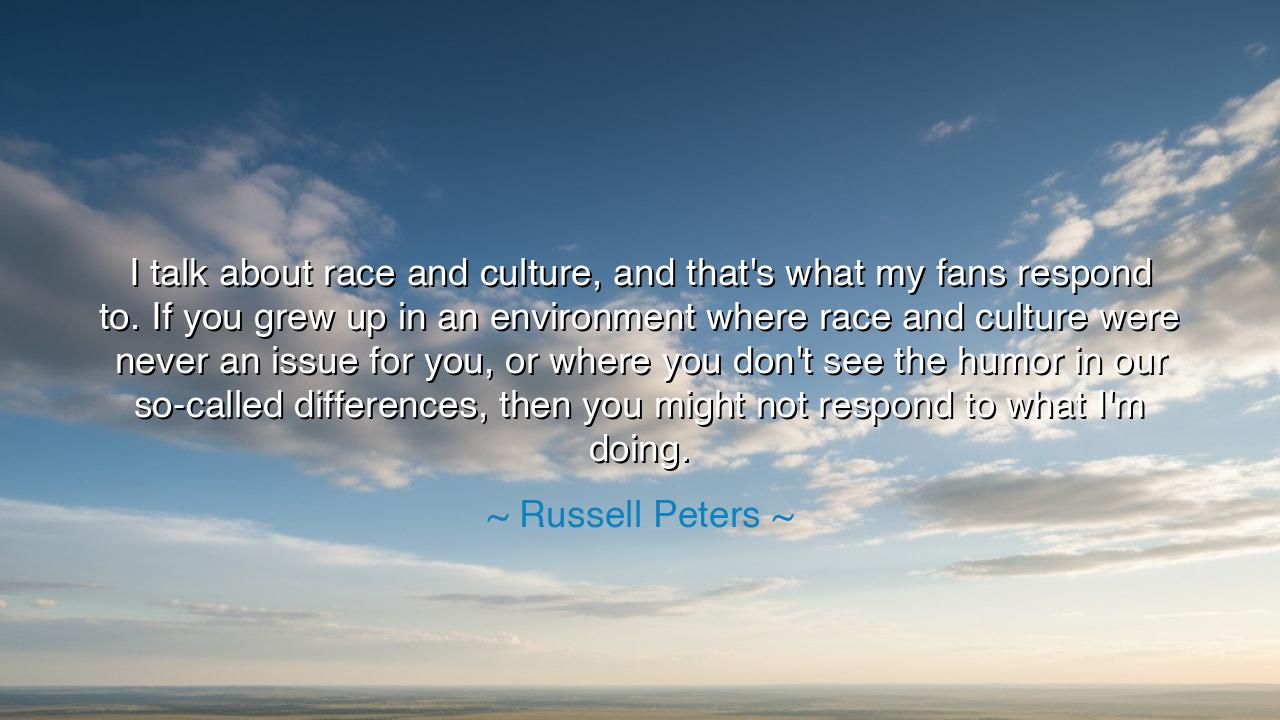
I talk about race and culture, and that's what my fans respond
I talk about race and culture, and that's what my fans respond to. If you grew up in an environment where race and culture were never an issue for you, or where you don't see the humor in our so-called differences, then you might not respond to what I'm doing.






The words of Russell Peters carry both laughter and revelation, for within his comedy lies the ancient power of truth spoken through jest. “I talk about race and culture, and that’s what my fans respond to. If you grew up in an environment where race and culture were never an issue for you, or where you don’t see the humor in our so-called differences, then you might not respond to what I’m doing.” These words are more than a defense of his art; they are a reflection on the eternal human struggle — to understand one another, to laugh at our divisions, and to turn the walls between us into bridges of understanding. His statement belongs to the lineage of the wise fools and sacred jesters, who through humor, reveal the hidden wounds of the world.
From the beginning of civilization, race and culture have been forces that both unite and divide. They shape our stories, our speech, our gestures — the very rhythm of our lives. Yet, as Russell Peters observes, they also form the fault lines where fear and misunderstanding dwell. To speak of these things openly, to find laughter within them, is an act of courage and wisdom. In his craft, Peters does what the ancient philosophers did through parable and poetry: he holds a mirror to society, showing not what we pretend to be, but what we truly are — imperfect, colorful, absurd, and human.
In the marketplaces of old, there were storytellers who made the people laugh even as they taught them. One such figure was Diogenes of Sinope, the wandering philosopher who mocked the hypocrisy of his fellow Greeks. When men spoke of virtue, he lived in a barrel; when they boasted of purity, he laughed and called them blind. Like Diogenes, Peters uses humor to expose what lies beneath the mask — not with cruelty, but with affection. His comedy disarms pride and invites reflection. For it is through laughter, not anger, that the truth can enter the heart without wounding it.
To find the humor in our differences is not to belittle them; it is to transform them. When Peters jokes about accents, traditions, or misunderstandings between cultures, he does not mock identity — he celebrates it. He reminds us that the human family, in all its diversity, is one grand mosaic. What divides us outwardly can unite us inwardly if we are humble enough to laugh at ourselves. Yet, as he says, those who have never faced these differences — who have lived where race and culture are invisible — may not understand his message. They have never been forced to find joy amid tension, nor to laugh as a way of surviving misunderstanding.
We might recall Richard Pryor, another prophet of laughter, who dared to speak of the pain and absurdity of race in America. Through his humor, he peeled back the layers of prejudice and fear, making his audience see themselves anew. His laughter was both rebellion and healing. So too does Russell Peters inherit this sacred tradition: the comedian as bridge-builder, truth-teller, and unifier. His jokes are not weapons but offerings — ways for us to meet across the divides of experience and history.
The lesson, dear listener, is not simply to laugh, but to listen while laughing. For humor, when it is born of truth, carries wisdom within its jest. It teaches us to look upon one another with curiosity instead of judgment. It shows us that to laugh at our differences is not to deny them, but to acknowledge them with grace. To find humor in pain is to reclaim power from it; to laugh together is to begin to understand one another.
Therefore, cultivate the art of compassionate laughter. When you encounter another culture, another color, another voice — do not recoil or judge, but seek to see the human story within it. Learn to find humor not at the expense of others, but as a way to share in their experience. For the wise know that humor is not mockery — it is empathy in disguise. Russell Peters, in his truth, reminds us that laughter can be both mirror and medicine: a mirror that shows us our shared humanity, and a medicine that heals the divisions we too often create.
Thus, let this teaching endure: laughter is the language of the soul, and those who wield it with wisdom, as Peters does, become teachers of unity. Let your words and your humor build bridges, not walls; let them remind you that every culture is a story worth hearing, and every difference a thread in the great tapestry of humankind. For when we can all laugh together — truly laugh — then we have already begun to understand one another, and peace is no longer a dream, but a living sound in the hearts of all.






AAdministratorAdministrator
Welcome, honored guests. Please leave a comment, we will respond soon